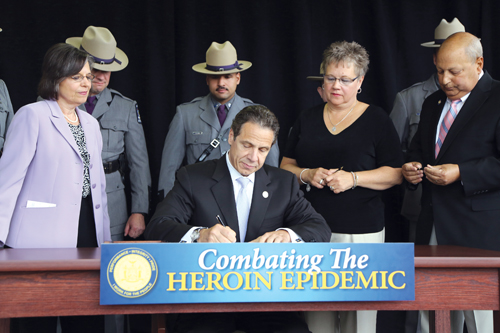State passes bills aimed at tackling growing heroin problem

“They say in drug abuse treatment, the first step is to admit the reality, right?” Gov. Andrew Cuomo asked last week. “We should not deny the problem we currently have with heroin.”
Legislation to combat the growing epidemic of heroin and opioid use — a problem that has reached the East End in recent years — was considered the “top priority” in Albany last week as the state legislative session came to a close, and Mr. Cuomo touted a package of 11 separate bills designed to address “the problem” from all angles.
Calling the epidemic a “public health crisis,” the governor unveiled legislation June 18 that was designed with four particular goals in mind: assisting enforcement against illegal trafficking of such drugs, helping with emergency response in overdose situations, improving treatment options for individuals suffering from heroin and opioid addiction through insurance reforms and creating public awareness campaigns with reach to school-age children, adults and even prescribers, who are the legal gatekeepers to opioid drugs.
“I believe that this is a comprehensive approach. It has a public safety component, has a public health component and also has a public awareness campaign,” he said during a press conference about the bills, flanked by leaders of both legislative houses, as well as the state’s health commissioner.
The 11 bills were passed unanimously June 19 and were signed into law Monday during a press conference at Binghamton University. The governor said funding for all of the measures and other treatment services would be addressed in the next budget cycle.
At the same time, Mr. Cuomo announced plans to hire 100 additional experienced investigators for the State Police Community Narcotics Enforcement Team.
Suffolk County District Attorney Thomas Spota has already asked that some of these new hires be placed with the East End Drug Task Force, a multi-jurisdictional unit that investigates drug activity in the area.
In a letter to Mr. Cuomo requesting additional police resources, Mr. Spota called Suffolk County “ground zero in this crisis.”
According to data released in February by Dr. Michael Lehrer, chief toxicologist with the Suffolk County medical examiner’s office, heroin-related deaths have increased countywide by almost 300 percent in the past four years — from 28 in 2010 to 64 in 2011 and 83 in 2012, with at least 82 deaths reported in 2013.








